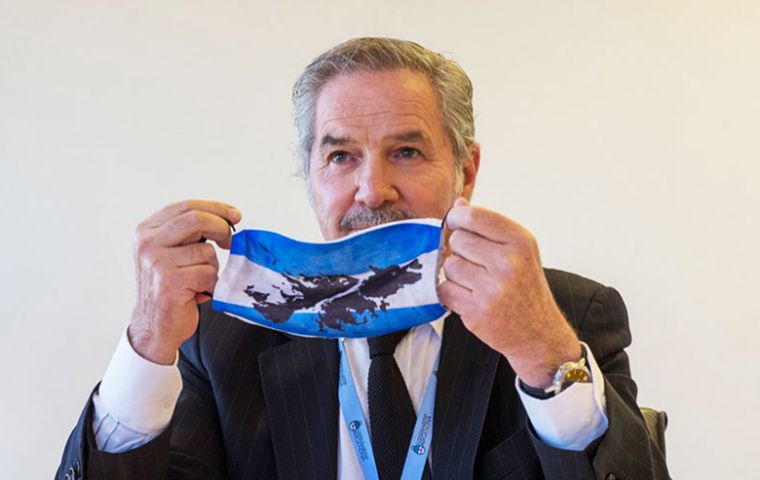MercoPress. South Atlantic News Agency
Falklands/Malvinas, the priority of Argentina/UK relations, Felipe Solá
 “Changing the Malvinas policy is changing the policy towards the United Kingdom”, Solá said in an interview with a Buenos Aires radio
“Changing the Malvinas policy is changing the policy towards the United Kingdom”, Solá said in an interview with a Buenos Aires radio Argentine foreign minister Felipe Solá anticipated that the Falklands/Malvinas Islands will be the priority in relations with the United Kingdom, and to protect the South Atlantic fisheries, fines have to be much harsher since now they are “ridiculous” low.
“Changing the Malvinas policy is changing the policy towards the United Kingdom”, Solá said in an interview with a Buenos Aires radio. “In this new approach it is essential to get the UK out of that comfort zone, in which they don't seat down to negotiate but nevertheless have a good relation with us, so the priority now with UK is the Malvinas”.
When asked specifically about the fishing activity in the region, Solá said that the “vessels now fishing in the Falklands/Malvinas 200 miles, which is an usurped zone, paying Falklands licenses, in reality they are fishing as if those waiting outside our 200 miles, because they are also committing an illegality”
Thus, “if we can identify them with satellites we are going to take them to court also as we do with those outside the 200 miles”, indicated the Argentine minister, recalling that “we have done the same with the oil companies that are operating to the north of the Falklands/Malvinas”
This week the Argentine government announced it was sending a bill to Congress to increase sanctions and fines to those illegally fishing in Argentine waters, “including waters adjoining to the Malvinas Islands”.
“We've warned them that under no change of name or whatever, they will be able to access our territory, and that made many companies to give up and leave. Nobody can exploit economically, except Argentina, this sea, soil and subsoil”
Further talking about fishing in Argentina's EEZ, Solá underlined, “to protect our fisheries we must have harsher fines because currently they are ridiculous low”.
Now the fine will be the equivalent of 300.00 liters of fuel, plus what it has in its hold, plus the costs of the arrest operation. “That is going to discourage fishing vessels to slip into our EEZ to poach”.
Not only that, “there can be aggravating circumstances that can make the total fine multiply by six. You can be sure that companies will take notice of this. It's a huge sum for companies, plus the vessel will not continue fishing”.
In a recent incident a Chinese flagged jigger caught poaching in Argentina's EEZ, manages to escape from the Coast Guard, protected by other jiggers. However the Argentines collected all the info possible, including satellite positioning and escape attitude of the vessel, and demanded the company in court.
A couple of weeks later the jigger turned in. This followed a meeting of Argentine authorities with Beijing's representative in Buenos Aires. So the fact is the jigger turned in but it's not clear how significant was the political and diplomatic closeness of the current Argentine government with Beijing.




Top Comments
Disclaimer & comment rules-

-

-

Read all commentsDear Narnia,
Jun 14th, 2020 - 04:05 pm +2'It is a well-established practice, accepted as law that title over natural resources is to follow that over territory: accordingly, the sovereign subject enjoys the exclusive right to dispose of the natural wealth of the area which it exercises sovereignty.' (UN Stockholm Declaration 1972, Principle 21 & UN Rio Declaration 1992, Principle 2, Declarations on the Human Environment).
Similarly, in the Gulf of Maine case, the ICJ has also stated that, ‘The thrust of this principle is to establish by implication that any delimitation of the continental shelf effected unilaterally by one state regardless of the views of the other state or states concerned is in international law not opposable to those states,’ and ‘No delimitation between states with opposite or adjacent coasts may be effected unilaterally by one of those states.’ And ‘The delimitation of the exclusive economic zone between states with opposite or adjacent coasts shall be affected by agreement on the basis of international law...’ (ICJ Case Concerning Delimitation of Maritime Boundary, Gulf of Maine area, Canada/USA, 12 Oct 1984, P50, para 87 p52, para 95 & p57, para 112(i).)
ArgieBargy continues even on the anniversary of their surrender. They will never learn. They can never win.
Jun 14th, 2020 - 11:37 pm +1One of the things I really like about Uruguayans is their remarkable tax advantages and they’re upping the ante in attracting foreign capital investment. A lot of Argentines are looking for shelter.
Jun 15th, 2020 - 01:28 am +1“It’s basically targeted to families wanting to live and invest here,” Fischer said in a telephone interview. “This isn’t an Argentine-focused initiative, but it’s natural to think that Argentines will be the majority of applicants.”
https://news.bloombergtax.com/daily-tax-report-international/for-less-than-400-000-you-can-now-get-tax-residency-in-uruguay
Commenting for this story is now closed.
If you have a Facebook account, become a fan and comment on our Facebook Page!